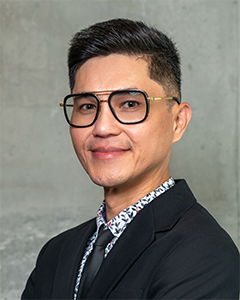Thye Peng Ngo, PhD, RN, FNP, CNE, CHSE

University of Michigan School of Nursing
400 North Ingalls Building
Ann Arbor, MI 48109-5482
Interests
- Substance use and co-use
- Mental health and syndemic conditions
- Marginalized populations
- Mixed-methods research
- Community-based and implementation science
Dr. Thye Peng Ngo is a nurse scientist whose research focuses on substance use, mental health, and health inequities among marginalized populations, including LGBTQ+ individuals, unhoused communities, and Veterans. His current studies examine alcohol use and sexual risk behaviors among adults, tobacco use among hospitalized patients in a safety-net hospital, and housing trajectories among unhoused youth. He is also exploring the use of AI-assisted tools to support qualitative data analysis. Dr. Ngo applies syndemic theory and community-engaged approaches to understand how structural and social conditions influence behavioral health outcomes. He is actively pursuing advanced training in mixed-methods research, implementation science, and intersectionality frameworks to strengthen the design and impact of equity-focused interventions. A certified nurse educator (CNE) and certified healthcare simulation educator (CHSE), Dr. Ngo continues to engage in nursing education and simulation research to advance nursing science and education.
Current Research Grants and Programs
- Mentored Scientist Award, UCSF-Bay Area Center for AIDS Research (CFAR), 2025-2026, PI
Teaching
Dr. Thye Peng Ngo is a nurse educator with over a decade of experience teaching at the undergraduate and graduate levels. His pedagogy is grounded in progressive constructivism, emphasizing experiential learning, critical reflection, and learner-centered engagement. He views teaching as both answering questions and questioning assumptions—an approach that fosters curiosity, critical thinking, and clinical reasoning. As a certified nurse educator (CNE) and certified healthcare simulation educator (CHSE), Dr. Ngo designs psychologically safe and inclusive learning environments that support peer collaboration and clinical decision-making, a core focus of his dissertation research. He has taught and mentored pre- and post-licensure nursing students, advanced practice residents, and future educators. As a Queer Asian immigrant, Dr. Ngo integrates inclusive and equity-driven practices to ensure diverse voices and lived experiences are reflected in the curriculum. His instructional work prepares nurse leaders to advance health equity, lead with empathy, and navigate complexity in today’s healthcare systems.
Affiliations / Service
- Member, Society for Simulation in Healthcare, 2016-present (Systematic Review Group 2022-2023)
- Member, National League for Nursing, 2020-2present
- Member, Sigma Theta Tau International, 2021-2025 (Governance Committee, Gamma Tau at-Large, 2022–2024; Grant Reviewer, 2024–2025)
- Member, San Francisco VA Nursing Research Advisor Council, 2023-2025
- Research Consultant, Larkin Street Youth Services, 2023-2025 (pro bono)
- Research Consultant, Chapin Hall, 2024-present
Notable Awards / Honors
- Mary Ann Rizzolo Doctoral Research Grant, National League for Nursing, 2023
- Chancellor Scholar Award – Honorable Mention, Indiana University Graduate School, 2023
- Travel Award, Center for AIDS Research, 2023
- Foundation for Nursing Education Scholarship Award, National League for Nursing, 2021
- Faculty Innovating for Nursing Education (FINE) Scholar Award, Indiana University School of Nursing, 2020–2023
- Clinical Instructor Award: Excellence in Graduate Teaching and Mentoring, Charles R. Drew University, 2017
Education
- PhD, Indiana University, Indianapolis, IN 2023
- MSN, Western University of Health Sciences, Pomona, CA 2014
- ADN, College of Canyons, Santa Clarita, CA 2008
- BS, University Putra Malaysia, Malaysia, 2002
- Certificate Advanced Training in Clinical Research, UCSF, 2024
- Postdoctoral Research Fellowship, NCSP, UCSF/San Francisco VA Health System, 2023-2025
Publication Highlights
Ngo, T. P., Neilands, T., Flentje, A., Dilworth, S., & Riley, E. (2025). Unmet subsistence and mental health needs in women experiencing homelessness: Rethinking care models for improved outcomes. Journal of General Internal Medicine. doi: 10.1007/s11606-025-09709-x.
Ngo, T. P., Keyhani, S., Leonard, S., & Hoggatt, K. J. (2025). Substance use and use disorders among Veterans on long-term opioid therapy. Drug and Alcohol Dependence Reports, 16, 100347. https://doi.org/10.1016/j.dadr.2025.100347
Ngo, T. P., Cuffaro, T., & Santos, G. M. (2024). Syndemic conditions associated with hazardous alcohol consumption among sexual minority men in San Francisco. Drug and Alcohol Dependence Reports, 13, 100297. https://doi.org/10.1016/j.dadr.2024.100297
Ngo, T. P., Draucker, C. B., Barnes, R. L., Kwon, K., & Reising, D. L. (2024). Peer emotion in collaborative simulation among nursing students. Journal of Nursing Education. 63(11), 746–754. https://doi.org/10.3928/01484834-20240614-04
Ngo, T. P., Draucker, C. B., Barnes, R. L., Kwon, K., & Reising, D. L. (2024). Peer collaborative clinical decision-making in nursing simulation: A theoretical framework. Journal of Nursing Education, 63(7), 435–443. https://doi.org/10.3928/01484834-20240505-08
Rutherford-Hemming, T., Herrington, A., & Ngo, T. P. (2024). The use of standardized patients to teach communication skills—A systematic review. Simulation in Healthcare, 19(1S), S122. https://doi.org/10.1097/SIH.0000000000000766
Ngo, T. P., Barnes, R., & Reising, D. (2023). Hybrid concept analysis: Peer collaborative clinical decision-making in nursing simulation. Journal of Nursing Education, 62(5), 269–277. https://doi.org/10.3928/01484834-20230306-06
Ngo, T. P., Antisdel, J. L., Xing, K., & Reising, D. L. (2023). Relationships between remote learning modalities and nursing students’ perceptions of their sleep quality during the covid-19 pandemic. Nurse Educator, 48(2), 41-46. https://doi.org/10.1097/NNE.0000000000001320





